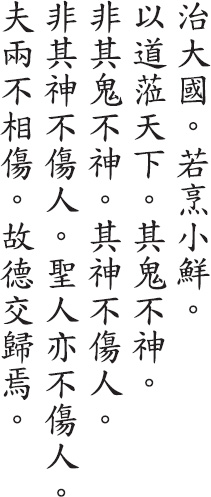60
 |
Ruling a great state is like cooking a small fish when you govern the world with the Tao spirits display no powers not that they have no powers their powers don’t harm the people not that their powers can’t harm the sage keeps them from harming and neither harms the other for both rely on Virtue |
In a poem bemoaning the absence of virtuous rulers, the SHIHCHING says, “Who can cook fish / I’ll wash out the pot” (Kuei: 4).
LI HSI-CHAI says, “For the sage, ruling a state is a minor affair, like cooking a small fish.”
HO-SHANG KUNG says, “If you cook a small fish, don’t remove its entrails, don’t scrape off its scales, and don’t stir it. If you do, it will turn to mush. Likewise, too much government makes those below rebel. And too much cultivation makes one’s vitality wither.”
HAN FEI says, “In cooking a small fish, too much turning ruins it. In governing a great state, too much reform embitters the people. Thus, a ruler who possesses the Way values inaction over reform.”
TE-CH’ING says, “A cruel government brings calamity down on the people. The people, however, think their suffering is the work of ghosts and spirits and turn to sacrifice and worship to improve their lot, when actually their misfortune is caused by their rulers.”
THE TSOCHUAN says, “If the state is meant to flourish, listen to the people. If the state is meant to perish, listen to the spirits” (Chuang: 32).
WANG CHEN says, “The government that takes peace as its basis doesn’t lose the Way. When the government doesn’t lose the Way, yin and yang are in harmony. When yin and yang are in harmony, wind and rain arrive on time. When wind and rain arrive on time, the spirit world is at peace. When the spirit world is at peace, the legion of demons can’t perform their sorcery.”
WANG PI says, “Spirits don’t injure what is natural. What is natural gives spirits no opening. When spirits have no opening, spirits cannot act like spirits.”
CH’ENG HSUAN-YING says, “Spirits dwell in the yin, and people dwell in the yang. When both accept their lot, neither injures the other.”
SU CH’E says, “The inaction of the sage makes people content with the way they are. Outside, nothing troubles them. Inside, nothing frightens them. Even spirits have no means of using their powers. It isn’t that spirits have no powers. They have powers, but they don’t use them to harm people. The reason people and spirits don’t harm each other is because they look up to the sage. And the sage never harms anyone.”
WU CH’ENG says, “The reason spirits don’t harm the people is not because they can’t but because the sage is able to harmonize the energy of the people so that they don’t injure the energy of the spirit world. The reason neither injures the other is due to the sage’s virtue. Hence, both worlds rely on the virtue of the sage.”
HSUAN-TSUNG says, “‘Neither’ here refers to spirits and the sage.”
LI JUNG says, “Spirits and sages help people without harming each other. One is hidden, the other manifest. But both rely on virtue.”
SUNG CH’ANG-HSING says, “Spirits are spirits because they respond but can’t be seen. Sages are sages because they govern but don’t act. The virtue of sages and the virtue of spirits is the same.”
Commenting on the Taoteching is also like cooking a small fish. Better to have left it in the sea. Commentators are divided as to whether the subjects of lines nine and ten are spirits and the people or spirits and the sage. Given the usual ambiguous syntax of the Chinese language, both are possible, but my reading gives the nod to spirits and sages.